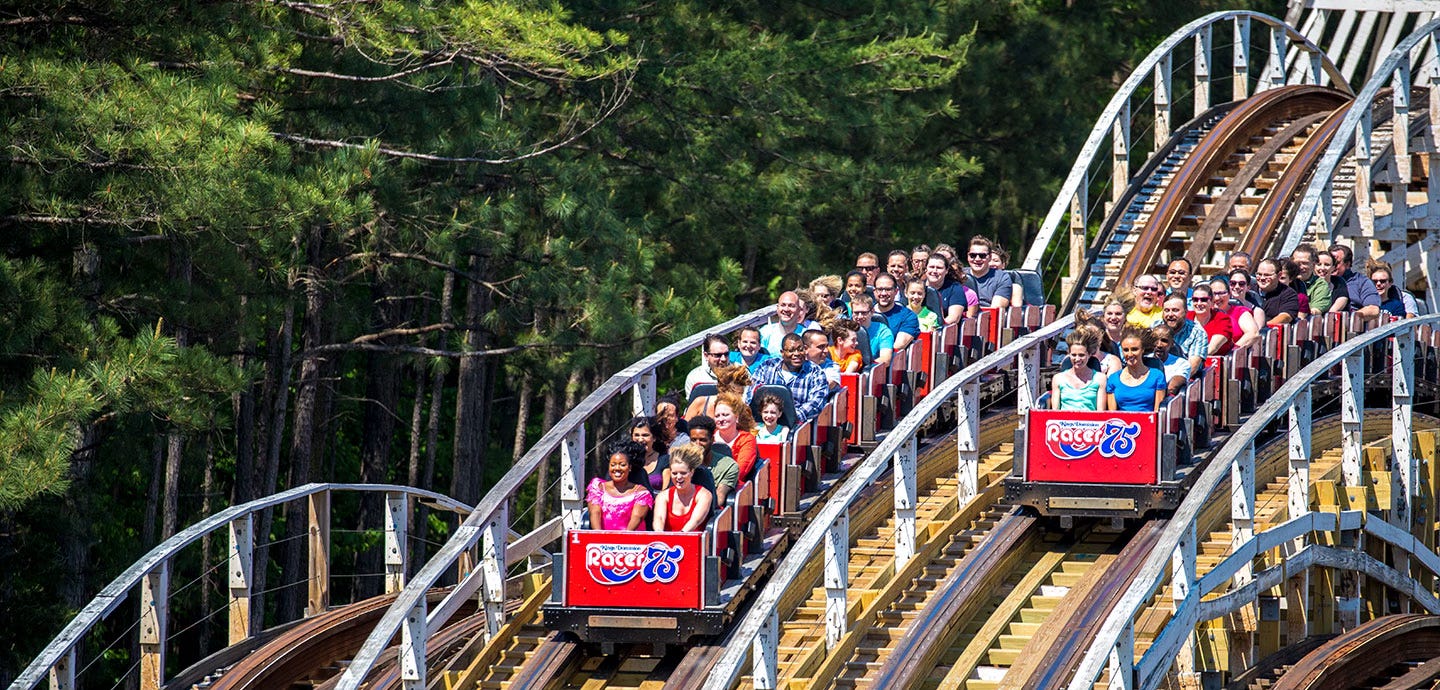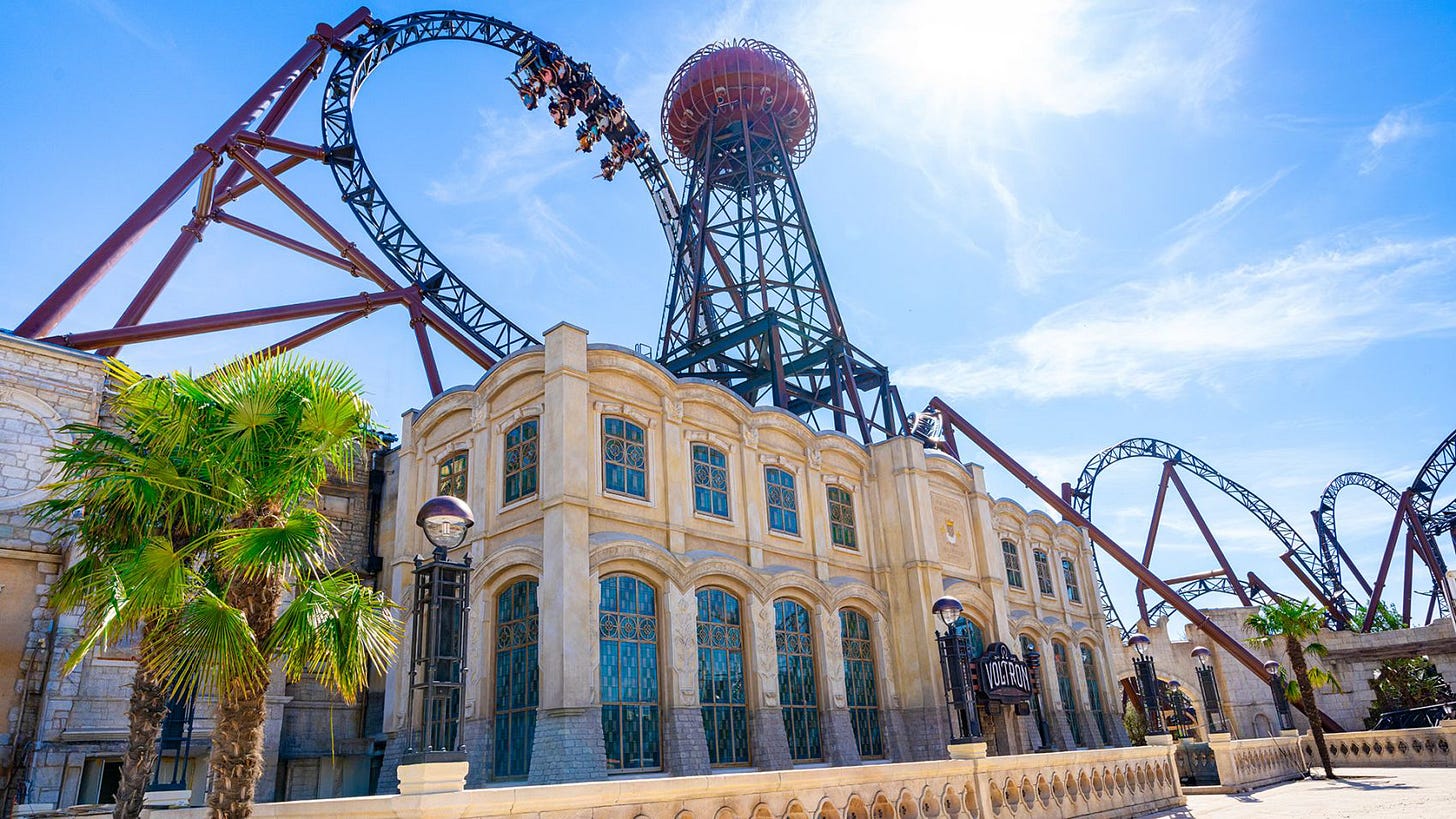Hey there ATP paid subscribers! Check out my audio narration of this article–ART Talks audio: Why do we love roller coasters? If you are not a paid subscriber, how about becoming one to get bonus content like this and support my work at About Theme Parks? Paid subscriptions are my only source of income here.
If you subscribe to About Theme Parks and are reading this, chances are you’re crazy about coasters. But have you ever stopped to wonder why?
What is it that draws us to these wacky contraptions? Why are roller coasters wildly popular? Why is it some 140 years after their introduction, they remain the king of the midway? For example, coasters will figure prominently in the attraction lineup at the hugely anticipated Universal Epic Universe opening next year–and at virtually every other park under development now and likely well into the future. But why?
I don’t claim to have definitive answers, but I definitely have some thoughts. Perhaps you’ve pondered this as well and have your own ideas about the lure of the rails. Tomorrow (Friday, May 31), paid subscribers can join the monthly “What’s the Attraction?” discussion thread to weigh in on why we love roller coasters.
We are hard wired to crave coasters
We humans are, by design, hunter-gatherers. It’s in our DNA. When we were prehistoric nomads, we hunted animals for sustenance. On the prowl for prey, our ancestors often found themselves in gravely dangerous situations. When their lives were threatened by the animals they hunted, the “fight-or-flight” response–which comes pre-loaded as part of humans’ factory settings–helped them survive. It triggered their autonomic nervous systems, which provided them with bursts of energy to either battle their attackers or flee from them.
As we have evolved, most of us no longer need to hunt for our food (Ted Nugent notwithstanding). Meat is available conveniently shrink-wrapped at the local Piggly Wiggly. But our genetic predisposition to activate the fight or flight response remains. With no saber-toothed tigers available, we head to the amusement park and board roller coasters to get our fixes.
Even though we logically know we are not in any real danger as we crest the lift hill of a coaster, our autonomic nervous systems nonetheless perceive it as such and go into overdrive. A sequence of hormonal and physiological changes occur, almost instantaneously. Our glands pump adrenaline and blood sugar filling us with energy; our heart rates increase and we breathe more rapidly, which makes us hyper-alert; our eyes dilate and our senses of sight and hearing sharpen. It’s a feeling of euphoria–a natural high. I (and others) use the expression “roller coaster junkie.” It’s an apt metaphor. The fight or flight response may be the most potent reason why we crave coasters.
By the way, the perception of danger (even though no danger actually exists) may also explain why many people stay the heck away from roller coasters. The pain pleasure principle, as advanced by Sigmund Freud, attests that we choose to avoid situations in which we would be caused pain (and, conversely, seek situations that would provide pleasure.) Where we see orchestrated, “safe” danger on the midway and run to get in line for a hit of chest-pounding adrenaline, coaster naysayers see painful danger and head for the carousel.
We want to be heroes
Just as we humans typically no longer need to join our fellow nomads to hunt for food, we also generally don’t have a heckuva lot of opportunities to exhibit bravery. Sure, there are some among us who are truly courageous, but it’s not often that we suit up in armor and go on quests to slay beasts these days. Yet, we long to be heroes.
Because there is no real danger, there’s nothing particularly valorous about strapping into a roller coaster and enduring a couple minutes of high-speed action punctuated with G-forces. Regardless, after we get off a ride, we feel triumphant. There is a sense of mastery, a validation of having vanquished our fears. Like modern-day knights in shining armor, we high-five one another in acknowledgement of our steadfast bravery and our heroism. And it feels great.
We want to be in the moment
Granted, we no longer have to hunt for our food or don suits of armor. Nonetheless, modern-day life can often be hard. There are bills to pay, tough decisions to be made, people to care for, maddening traffic jams, bosses to please, and any number of other things that contribute to the daily grind. When we board a roller coaster, however, the mounting bills, crappy bosses, and everything else fade away. Riding the rails, we can’t help but be hyper-focused and fully present. It’s like a mini yoga session. Perhaps we should bow and say “namaste” to one another after we exit the station.
While it’s especially acute while riding a coaster, the desire to be in the moment extends to amusement and theme parks in general. When we pass through the turnstiles, we leave the real world behind and forget about life for awhile. As the plaque at the entrance to Disneyland famously reads, “Here you leave today and enter the world of yesterday, tomorrow, and fantasy.”
Coasters are works of art
I contend that another one of the reasons we are drawn to roller coasters is because many of them are magnificent works of art. Aesthetically, they can be stunning–mesmerizing even–to behold. They are dazzling pieces of kinetic architecture and represent incredible feats of engineering. Even coaster wimps admire them and enjoy watching them from a safe distance on the midway.
We passively observe most great works of art, such as paintings, statues, buildings, movies, music, and literature. Roller coasters, however, are experiential. As members of an audience, we may, say, appreciate the harmonies and dynamics of a live musical performance. But as coaster passengers we actually soar over the hills and experience the crescendos, drops, and other elements first hand. It’s intensely personal (and just plain intense).
Coasters bring people together
It’s great getting an adrenaline rush, feeling like a hero, being in the moment, and appreciating the artistry of a roller coaster. But you know what’s way better? Getting an adrenaline rush, feeling like a hero, being in the moment, and appreciating the artistry of a roller coaster with your buddies. Rides are inherently social experiences and are meant to be shared. As such they are catalysts for families and friends to join together, and they become the stuff of lore in our collective narratives.
It’s not just those we came to the park with whom we bond on coasters, however. It’s the entire train, along with the folks in the station, the spectators on the midway, and the people in the queue. Everybody at the coaster is there for a singular purpose, united by the glee and exhilaration that the thrill machine imparts. It may seem sometimes like our society is hopelessly polarized and broken, divided into warring factions that are at constant odds. But I believe, perhaps naively, that despite the social media vitriol and other forces at play to keep us sequestered in our silos, deep down most of us actually want to get along. Coasters provide a safe space where we can celebrate our commonality and meet in solidarity.
There are no red states or blue states aboard a coaster. (Although some dual-track coasters have red trains and blue trains.) Nobody cares about your background, your beliefs, how much money you have or don’t have, or anything else about you. (Unless you are a line jumper, in which case you deserve abject scorn.) There are just coaster riders screaming in cathartic unison and having a ball together.
As with being in the moment, the egalitarian community building that coasters precipitate extend to amusement and theme parks at large. There are many reasons why parks are so popular and hold such great appeal. One of them, I believe, is because they are one of the few places where we can gather, leave our agendas behind, be civil with one another, and experience wonder and joy together. They speak to the better angels of our nature and are life affirming.
I don’t know about you, but I seldom feel more alive than when I am riding a coaster with a trainload of my fellow humans.
Okay, it’s your turn. Paid subscribers, please gather your thoughts. Then weigh in on why you think we love roller coasters tomorrow (Friday, May 31) by joining this month’s exclusive “What’s the Attraction?” discussion thread.











